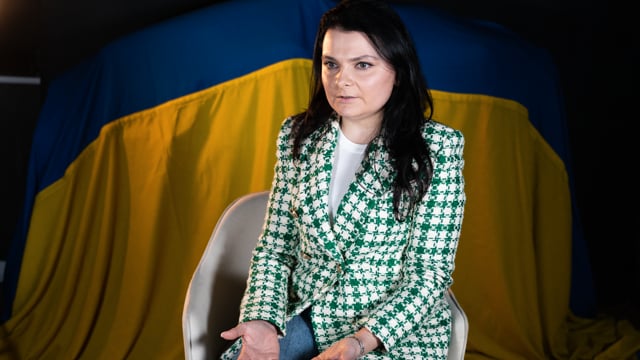[WATCH] ‘It seems like the world is watching a Netflix show, but Ukrainians are living it’
Vita Boronylo, a Ukrainian refugee, tells KARL AZZOPARDI Malta has been welcoming to her but it is still not home


Exactly a year ago on Friday, Russian President Vladimir Putin launched a full-frontal assault on several of Ukraine’s main cities.
Many expected a quick Russian victory resulting in the imposition of a puppet government in Kiev which would have brought Ukraine back in Putin’s sphere of influence.
It was the heroic fight-back and resilience of ordinary Ukrainians led by the charismatic President Volodymyr Zelensky in the early days of the war, which stopped this from happening.
One year later, it is clear that the attempt to overthrow Ukraine’s legitimate government has failed. Not just in the military sense – though Russia’s failure in that department is clearly evident – but also, in the very objectives that the invasion had set out to achieve.
Vita Boronylo, 33, was living in the Ukrainian capital of Kiev when the shelling started, and has now moved to Malta to escape the harsh reality of war.
She recalled the confusion and panic which reigned during the early days of the invasion.
“The war for me started on 24 February when mum called me at 4am telling me bombs were being dropped on Kiev, and the Russians were bombing the country. It was touch and go, we packed the backpacks, got our documents and started moving,” she said.
Vita and her sister were trying to make their way to the town of Pryluky, which lies in the eastern region of Kiev.
She explained how the scenes were straight out of a post-apocalyptic movie. “Traffic was everywhere, shops were empty, people running, and lines for petrol were tens of cars long.”
Pryluky, Vita’s hometown, where all her family live, is a buffer zone, and was imposed with a mandatory curfew from 6pm to 6am.
In what resembles one of our grandparents’ stories about World War 2, she explained how they were instructed to turn off the lights, as Russians would be aiming at them, even though they were civilians.
“It’s a radical change you have to go through. I went from walking my dog and going to work, to living in darkness and hiding in a bomb shelter,” she said. “For the first days you are confused, you try reaching out to friends in the military to get an idea, but no one knew what was going on.”
On the second day of the invasion, news started spreading that Russian troops were 20km from their home, which translates to the approximate distance between Marsaskala and Mosta.
She explained how the instinct to protect your family and home kicks in. “My friends, parents and I started collecting used empty bottles to make Molotov cocktails for the soldiers who were at military outposts and checkpoints.”
“News was also spreading that civilians were being killed by Russian soldiers, and at that time it struck me that I was not safe. It was a conflicting feeling, because when you feel threatened you want to go home, but home was not safe,” she said. Together with her sister they decided he needed to leave the country.
“As I was packing, my father saw me cry, and I remember telling him ‘I hate Putin, because he forced me to do a decision which I didn’t want. I never wanted to leave my family, I never wanted to leave the country, I never wanted to leave my home’,” she said.
After a two-day trip to get to Western Ukraine, which was a completely different landscape to the East, Vita and her sister crossed the border to Romania, then Slovakia, Hungary and then Poland, before ultimately making their way to Malta.
She explained how the war has brought Ukrainians together. “‘The whole world is watching a Netflix show, but Ukrainians live it every day.”
Vita explained that despite leaving, there is still a small part of her which will never leave Ukraine. “It’s like living in two realities. I am here in Malta, but my family, friends and home are still there.”
“My grandmother has her 85th birthday today. I can’t hug her, I can’t kiss her, I can’t hold her. That is not right,” she said. “I also have a friend who has a two-year-old son. His father is fighting in the war, and has seen his son for maybe three times in the last year. He is asking her whether his dad is still alive, imagine that feeling.”
Vita Boronylo said she would like Putin to pass through the emotional roller-coaster Ukrainians have felt over the past year. “I wish he can feel the emotions mothers with dead sons feel, I want him to feel the fear raped women feel, I want him to feel scared like children fleeing their homes.”
But for Vita, it’s not only Putin’s fault, and she wants Russians to stand up against evil. “People will say it is Putin’s fault, but it’s not Putin who is firing the shell, it’s not Putin firing the gun, it’s not Putin flying the plane, it’s not Putin who is killing civilians, it’s not Putin who is raping women. There is still an individual behind the decision.”
One year on from the war, uncertainty still reigns in Vita’s life. While the reception and help in Malta has been great, it is still not home.
“Every time my mum doesn’t pick up the phone, or I read something on the news, my heart stops,” Vita said. Unfortunately, the end still seems so far away.



.png)


.jpg)












.jpeg)


